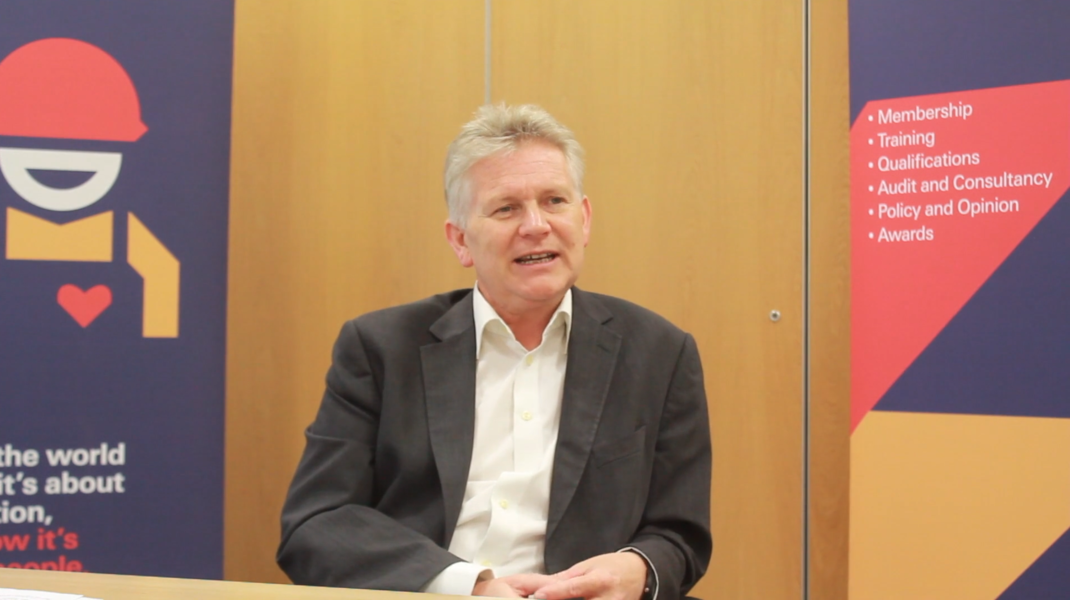In this video Mike Robinson, CEO of The British Safety Council, discusses - what the future holds for the health and safety profession and the future for health and safety regulation.
The British Safety Council is dedicated to making sure no-one is injured or made ill at work. The Council was founded in 1957 by James Tye, who was a pioneering campaigner who helped to transform the British way of life. His efforts led directly to the ground-breaking 1974 Health and Safety at Work Act, as well as the introduction of car seat belts.
What does the future hold for the Health and Safety professional?
I think in some ways there'll be a lot of similarities to the sort of qualities of good health and safety professionals today. Really good communicators, good facilitators. So, I think in terms of those skills they will be very similar. I think there will be big, big changes though overall, and I think it's hard to imagine what technology will be like in 60 years’ time and how it will change working. It's changing already in terms of flexibility, supporting the gig economy, supporting very different ways of working. And the boundary between home and the workplace is blurred all the time. So, I think that the role will become broader in than that respect.
What is the future for health and safety regulation?
I think also if health and safety can really be embedded within the role of managers and within workers, it will become even more as a sort of specialist smaller team of advisors than the larger teams we see today. So, I think there will be probably fewer health and safety professionals, but they will be acting in a more specialist advisory capacity.
The government's policy on deregulation. I, and we as an organization, believe is very, very dangerous. The arbitrary removal of regulations by having rules that for every new piece of legislation, two pieces need or even three pieces need to be removed from the statute book, is just not simply a way we believe is sensible in terms of getting to what everybody wants which is proportionate regulation. Nobody wants overregulation.
But what we mustn't do is remove good legislation that is proportionate. And therefore, we have urged the government. We've been a joint signatory of a letter. It's come off the back of Grenfell, the disaster-- the tragedy at Grenfell Tower. But it's equally applicable to moving forward with Brexit that the arbitrary removal of regulation without a good evidence base, we believe, is very, very dangerous. It has to be evidence-based and it has to be proportionate. So, we urge the government to focus on proportionate regulation, not arbitrary deregulation.
What does the future hold for the British Safety Council?
I think it's fair to say that we, 30 years ago, had a greater impact and had a greater level of influence than we do today, and that is for a whole host of reasons. Not least because there are many more organizations today focused on health and safety in the UK than there were 30, 60 years ago. I think over the next 60 years, you will see the British Safety Council have a greater focus on health as opposed to primarily focusing historically on safety matters.
So a definite increase on health. Particularly I think within that, mental health, I think, as everybody is realizing the effect and the cost to business and the impact on people's health from a mental health, as opposed to a physical health, perspective. So in the future I think looking at those areas and probably looking more internationally, we will increase the impact again. Maybe not quite to the levels that James Tye achieved in his very, very controversial ways. The world has moved on since then. But I think on a broader set of fronts we will have increasing influence over the next 10, 20, 30, 40 plus years.
The British Safety Council is dedicated to making sure no-one is injured or made ill at work. The Council was founded in 1957 by James Tye, who was a pioneering campaigner who helped to transform the British way of life. His efforts led directly to the ground-breaking 1974 Health and Safety at Work Act, as well as the introduction of car seat belts.
